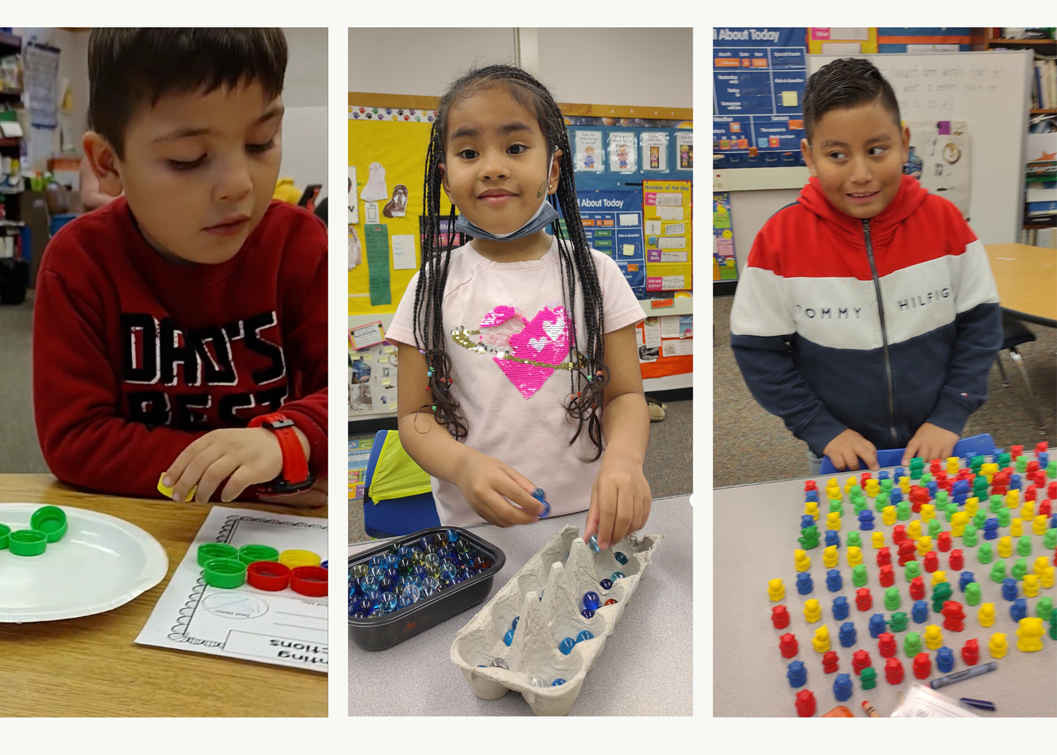Sonoma County educators focus on 'mathematical excellence' and equity through Lesson Study program
Date: 03/22/2023
Author: Nashelly Chavez, Sonoma County Office of Education

McDowell Elementary students participate in a counting activity in Mrs. Starr Salazar's classroom. (Photos courtesy of Starr Salazar)
Starr Salazar’s motivation for joining Lesson Study, a professional opportunity that allows teachers to further their understanding of what cultivates and impedes learning, was simple: she wanted to make math more fun for her students.
Salazar, a Special Day Class teacher of kindergarten through 3rd-grade students at McDowell Elementary in Petaluma, tapped into that goal earlier this year, when she gave her students the choice of an array of objects to count, along with tools and containers they could use to accomplish the task.
The lesson came from Megan Franke's Choral Counting & Counting Collections, a book she researched as part of Lesson Study. It offers ways for students to make sense of key concepts that are often challenging to grasp.
Soon, she noticed one of her 3rd-grade students began assembling a pile of plastic teddy bears in rows of 10 without having received any direction to do so. The activity was an effective segue into a lesson planned for the next day on multiplication, an important concept for the student’s grade level, Salazar said.
“You remember those teddy bears? Well that’s what multiplication is all about,” Salazar said she told the student.
“For me to be able to take it from there the next day, it was fascinating,” Salazar said of the experience.
The exercise was part of her participation in the Lesson Study group, which is overseen by the Sonoma County Office of Education (SCOE). The program currently involves 10 groups of teachers throughout the county who meet in teams twice a month to share research, best practices, and insights from the lessons they incorporate into their respective classrooms as part of the program.
Emily Akinshin, a Math Coordinator at SCOE who facilitates Lesson Study, said the professional development has a dual focus on mathematical excellence and equity. It is designed to be teacher driven, explore best practices, and address equity challenges.
“They get to dive deeply into the lives of students, and that changes relationships and mindsets around our students,” Akinshin said of the teachers who participate in the program. “(It improves) relationships, empathy, brings focus to students' strengths rather than their weaknesses, and informs how lessons are designed based on that understanding.”
The program culminates in a public lesson, in which experts in the fields of mathematics and equity come to observe the Lesson Study participants as they design a lesson plan and then implement it with a group of students, followed by a debriefing session.
“We’re not looking at the teachers,” Akinshin said of the public lesson. “People who come in to observe the lesson are looking at students. We’re looking for how they respond to the lesson … and is their work evidence of what we wanted to achieve in the lesson?”
Josh Deis, a Math Coordinator at Petaluma City Schools who previously held Akinshin’s role at SCOE for 14 years, said Lesson Study has been around in Sonoma County since 1999.
It gained popularity after it proved an effective professional development tool for teachers, he said. He believes the program’s positive impact is multi-faceted, he added, boosting not only teachers’ confidence but also creating a space for them to get curious.
“It builds teacher leadership,” Deis said. “The teachers are driving the process and asking their own questions. Doing the study, that builds their leadership voice and advocacy voice for students.”
For Salazar, her participation in Lesson Study has helped her incorporate techniques that support deep student learning in a way that’s interactive for her students and branches outside of what’s in a textbook, she said.
“As teachers, we’re so afraid that we’re not going to hit whatever benchmark by a particular date, that we lose track of the meaning of everything,” she said. “But if you incorporate these (techniques), it will be easier for students to go through unit 3 and then 4 and 5, because there’s understanding there.”
The program typically starts in the fall, though recruitment begins in the spring semester, Akinshin said.
Want to learn more about Lesson Study? Contact Emily Akinshin at eakinshin@scoe.org.

